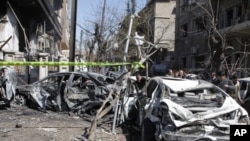Recent Terrorist Attacks in Syria
- Mar. 17, 2012: Twin car bombings near security facilities in Damascus. At least 27 killed.
- Feb. 10, 2012: Twin explosions near security buildings in Aleppo. 28 killed.
- Jan. 6, 2012: Suicide bombing near Damascus school and police station. 26 killed.
- Dec. 23, 2011: Twin car bombings near security facilities in Damascus. 44 killed.
Powerful explosions hit several important government security complexes in the Syrian capital, Damascus, Saturday, killing at least 27 people and wounding nearly 100 others. The Syrian government is calling the blasts "terrorist attacks" that may be linked to year-long protests against Syrian President Bashar al-Assad, while al-Arabiya TV reports the government itself may have been behind the explosions.
Syrian state TV showed images of charred bodies inside burned out vehicles which were still smoldering. It blamed the twin car bombings on “terrorists,” saying two suicide-bombers blew themselves up near government buildings.
The facade of one building crumbled from the force of the first blast, projecting glass, plaster and metal objects onto the street below. Cars in front of the building appear to have imploded, their windows shattered and their metal frames crumpled and twisted. Private homes in close proximity to the blasts were also devastated.
Victims at a nearby hospital appeared dazed and distraught. One young man said he was awakened by the early morning blast and got hit by flying debris. He says he was sleeping and was startled by a very loud noise and debris that began to fall, including windows, woodwork and objects flying in his face, chipping several teeth.
An elderly man with a white bandage over his head muttered and stammered incoherently. He said shame on those who did this. Shame on them. Shame on their rulers. Our country is important to us. Let them worry about their own countries. What do they want with us, he asked?
State TV interviewed dozens of people, many of whom blamed Gulf leaders and Arab satellite channels for provoking unrest in Syria. Religious Affairs Minister Mohammed Abdel Sattar Sayyed blamed Islamic extremists and radical Islamic clerics for the violence.
He says that religious clerics talking about sectarian conflict and hate are behind these terrorist acts and they bear responsibility for their words. The duty of clerics, he insists, is not to preach conflict, but to preach kind words that lead to love, mercy and forgiveness.
Christian Orthodox Bishop Jean Qawaq of Syria insisted that he has no idea who was behind the blasts, but that the only way to resolve Syria's ongoing conflict is through dialogue.
He said that he doesn't know who committed this crime and doesn't want to know, either, but that it was ugly and does not reflect the true nature of the Syrian people. He says he prays that Syrians from all parties, and those carrying arms put their arms aside and come to the dialogue table, since Syria's problems can only be solved through dialogue.
Syrian opposition activist Mohammed Sawwal in Damascus told al-Jazeera TV that he thought the Syrian government itself was behind the blasts. He claimed that government security forces re-routed minibuses away from the explosion sites moments before the blasts.
Joshua Landis, who heads the Center for Middle East Studies at the University of Oklahoma argues that the Syrian opposition is increasingly divided and that radical Islamic elements are increasingly in the vanguard of those opposing the regime.
"The only option for the opposition is to pursue a classic insurgency, which is hit-and-run with terrorist operations. This is the classic stuff we've seen in Iraq and Afghanistan, to try and destroy a more powerful army. What we're going to see in the future is more of these car-bombings. That's what got [the U.S.] out of Iraq and that's what is getting [the U.S.] out of Afghanistan, the inability to control the situation and the dogged willingness to martyr yourself.”
Landis argues that it will take many years for stability to return to Syria because numerous militias are springing up, without any central control. He says that Islamic extremists are funding part of the uprising, but insists that many Syrians dislike them as much as the government.
| Join the conversation on our social journalism site - Middle East Voices. Follow our Middle East reports on Twitter and discuss them on our Facebook page. |




